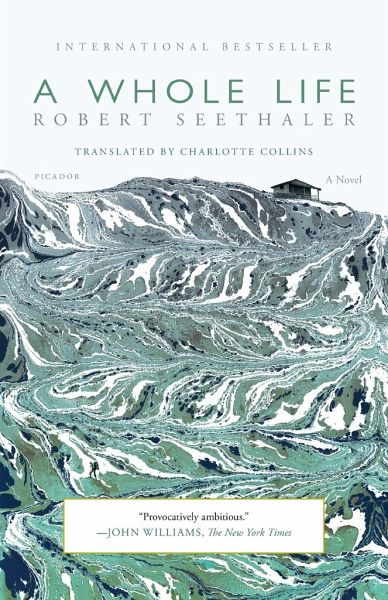

Although this is arguably exemplary of Egger’s quiet dignity, it is perhaps reflective more of a suppression of emotion, that he is unable to comprehend the suffering he has witnessed outside of his own village.

In fact, the war, and Egger’s confinement, is brushed over relatively quickly there is no indication that Egger feels any injustice at being kept prisoner long after the cessation of hostilities. Called up to fight in the Second World War, Egger offers no real commentary on the conflict, something I would have found especially interesting from a German author. This simplicity is often frustrating, however. He seems content with the life he has made for himself, literally moving hermit-like through various homes around the valley, without disturbing anyone. Egger is also clearly a man of conscience, demonstrated by his romantic proposal to his future wife, and his attempted rescue of the old man at the start. Egger helps to build and maintain the cable car that arrives in his village, providing a service for the influx of tourists, this work also drawing attention to the easily forgotten suffering of the workers, epitomised by one labourer losing his arm in an accident.

As such, Seethaler draws attention to the kind of labour that is often unrecognised. Andreas Egger is definitely someone you would want on your side: strong, dependable, not drawn from his path by shallow (sinful?) distractions. It has received obvious comparisons with Stoner with its pared down description of the life of a single, fairly solitary man, and the comparative inanity of his life I think it could equally be compared to Hemingway, not only for its sparse language, but its gritty, old fashioned portrayal of masculinity. 'A Whole Life' is deceptive in its simplicity. And whilst he does not seem dissatisfied with his life, he seems far from fulfilled, which adds to the bleak and desolate landscape. But at the same time there is something desperately sad about how lonely he appears. In this Egger is stoic, which I can admire.

As modernity permeates his village, Andreas Egger pushes back with his vision of how things should be and does not allow himself to be swept up in the transformation. Naturally a lone wolf, we follow Egger as he withdraws further into solitude, seemingly abhorrent of human contact. Through Egger, we see the result of real trauma and the impact of a tragic event. Robert Seethaler expertly depicts real emotion through him, and the result is extremely moving. I was struck by Andreas Egger as a character. The narrative is not linear, so although it is at times difficult to keep track of the timeline, this technique suits the feel of the novel (navigating through ambiguity in times of change). Charlotte Collins skilfully captures the bleak yet beautiful atmosphere through her translation. Set against a pastoral landscape, Seethaler's writing style is somewhat reminiscent of Thomas Hardy's novels.


 0 kommentar(er)
0 kommentar(er)
